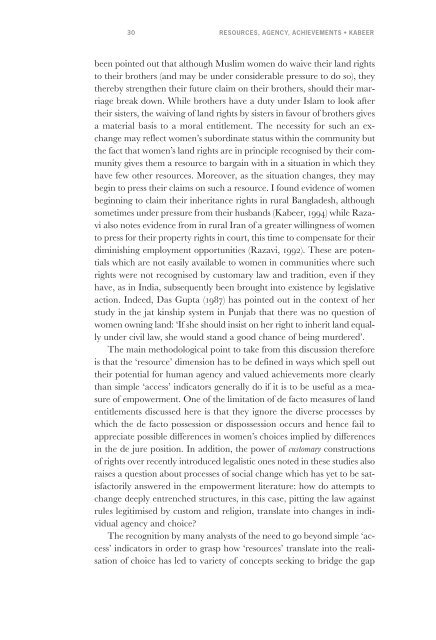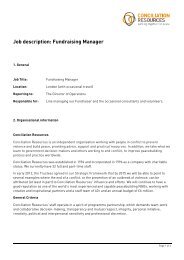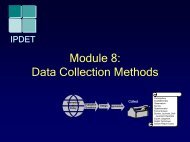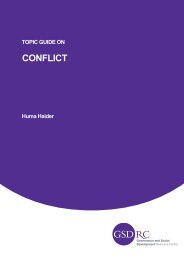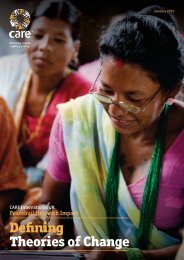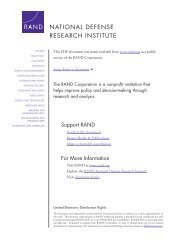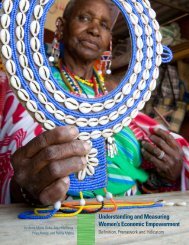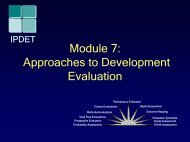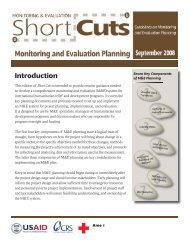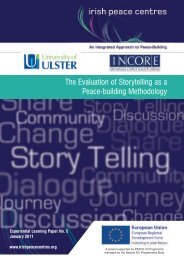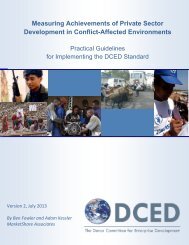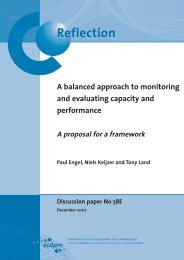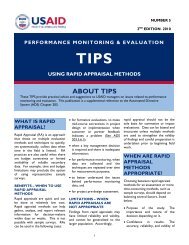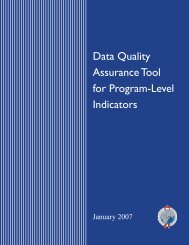Discussing Women's Empowerment - Sida
Discussing Women's Empowerment - Sida
Discussing Women's Empowerment - Sida
Create successful ePaper yourself
Turn your PDF publications into a flip-book with our unique Google optimized e-Paper software.
30 RESOURCES, AGENCY, ACHIEVEMENTS • KABEER<br />
been pointed out that although Muslim women do waive their land rights<br />
to their brothers (and may be under considerable pressure to do so), they<br />
thereby strengthen their future claim on their brothers, should their marriage<br />
break down. While brothers have a duty under Islam to look after<br />
their sisters, the waiving of land rights by sisters in favour of brothers gives<br />
a material basis to a moral entitlement. The necessity for such an exchange<br />
may reflect women’s subordinate status within the community but<br />
the fact that women’s land rights are in principle recognised by their community<br />
gives them a resource to bargain with in a situation in which they<br />
have few other resources. Moreover, as the situation changes, they may<br />
begin to press their claims on such a resource. I found evidence of women<br />
beginning to claim their inheritance rights in rural Bangladesh, although<br />
sometimes under pressure from their husbands (Kabeer, 1994) while Razavi<br />
also notes evidence from in rural Iran of a greater willingness of women<br />
to press for their property rights in court, this time to compensate for their<br />
diminishing employment opportunities (Razavi, 1992). These are potentials<br />
which are not easily available to women in communities where such<br />
rights were not recognised by customary law and tradition, even if they<br />
have, as in India, subsequently been brought into existence by legislative<br />
action. Indeed, Das Gupta (1987) has pointed out in the context of her<br />
study in the jat kinship system in Punjab that there was no question of<br />
women owning land: ‘If she should insist on her right to inherit land equally<br />
under civil law, she would stand a good chance of being murdered’.<br />
The main methodological point to take from this discussion therefore<br />
is that the ‘resource’ dimension has to be defined in ways which spell out<br />
their potential for human agency and valued achievements more clearly<br />
than simple ‘access’ indicators generally do if it is to be useful as a measure<br />
of empowerment. One of the limitation of de facto measures of land<br />
entitlements discussed here is that they ignore the diverse processes by<br />
which the de facto possession or dispossession occurs and hence fail to<br />
appreciate possible differences in women’s choices implied by differences<br />
in the de jure position. In addition, the power of customary constructions<br />
of rights over recently introduced legalistic ones noted in these studies also<br />
raises a question about processes of social change which has yet to be satisfactorily<br />
answered in the empowerment literature: how do attempts to<br />
change deeply entrenched structures, in this case, pitting the law against<br />
rules legitimised by custom and religion, translate into changes in individual<br />
agency and choice?<br />
The recognition by many analysts of the need to go beyond simple ‘access’<br />
indicators in order to grasp how ‘resources’ translate into the realisation<br />
of choice has led to variety of concepts seeking to bridge the gap


